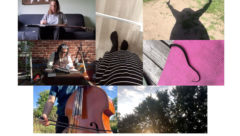 Improvising and Listening – December 18th
Improvising and Listening – December 18th
Thinking Spaces: The Reading Group and Speaker Series is pleased to present “Improvising and Listening,” a session on the Interactive Improvisation in Times of Isolation project featuring IICSI Researcher Dr. James Harley and students from the Critical Studies in Improvisation graduate program. This event will take place on Friday, December 18th, from 3-4:30 pm (EST), via Zoom. A Q&A will follow the talk.
In this session, Dr. Harley will introduce the project, and then each artist will introduce their piece and share their short audio-video recordings. There are seven artists, and each piece is about five minutes long. The artists will exchange comments and thoughts after sharing their works, and listeners are welcome to engage in the discussion and Q&A.
If you are interested in attending, please register online at uoguel.ph/InteractiveImprov
Interactive Improvisation in Times of Isolation is a project by IICSI Researcher and University of Guelph Professor, Dr. James Harley and Critical Studies in Improvisation (IMPR) Graduate Students, funded by the U of G “Creating in a Time of Coronavirus Fund,” along with matching support from the College of Arts, and private donors. Since the start of October 2020, the project has been sharing weekly improvised solo and group responses to ambient nature recordings. The project utilizes social media and online platforms to connect with the audiences in place of in-person performances.
“The aim of this project is to creatively showcase the realities of living in isolation. The group will produce a series of 14 short audio-video recordings of individual improvisational responses to ambient recordings (e.g. early morning birdsongs) and responses to each other’s improvisations in lieu of collaborating in person. The ambient recordings signify the current reality, where nature exists, even thrives, with muted human intervention. The responses to the soundscape recordings signify our awareness of that reality “out there,” with our emotional responses to the isolation we are experiencing. The interactions to each other’s responses signifies our adaptability, where we find ways to listen and engage, when in a “normal” situation we would interact face-to-face in the moment. Deep and critical listening can still be undertaken, even acting in physical isolation. The project also draws on awareness of neuro-diversity, where autism (and other assessments such as FASD) engenders creative responses to other, ongoing forms of isolation. Isolation can be uncomfortable when enforced, but can provide space for reflection and creative engagement.”
As always, Thinking Spaces is free and open to all. We hope to see you there!
Thank you to the University of Guelph’s Creating in a Time of Coronavirus Fund, College of Arts, and Private Donors for funding this project!







